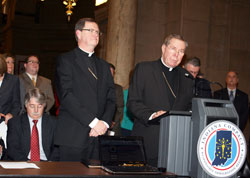Indiana Compact signers call for federal immigration reform

Archbishop Daniel M. Buechlein, right, speaks during a Feb. 9 ceremony at the Indiana Statehouse in Indianapolis during which he, Bishop Timothy L. Doherty of Lafayette, center, Indiana Attorney General Greg Zoeller, left, and other state religious, government and business leaders signed the Indiana Compact, an agreement that calls for immigration reform to happen at the federal and not state level. (Submitted photo by Charles Schisla)
By Brigid Curtis Ayer
Indianapolis Archbishop Daniel M. Buechlein and Bishop Timothy L. Doherty of Lafayette joined Indiana Attorney General Greg Zoeller, and more than 20 individuals representing Indiana’s business community, faith leaders and social service organizations, to outline and sign the Indiana Compact—a five-point plan guiding principles for immigration reform during a Feb. 9 Statehouse ceremony.
“Immigration is an issue that evokes strong emotions,” said Archbishop Buechlein. “We must not let the frustration that many people are feeling lead our legislature to pass bad legislation. The wide range of groups represented here today is evidence that the people of Indiana want a national answer to this problem, and not a patchwork of state and local laws.
“As we work to address the challenges surrounding the development of a sound immigration policy, we need our lawmakers to always keep at the forefront of their decisions the real human faces—the children and the families.”
Archbishop Buechlein also spoke about the situation of immigrants in light of the Gospel, and said that national immigration policy should help us to welcome strangers as Christ.
“The issue of immigration has been an example of the failure of the federal government in setting and enforcing clear policies in an area of their sole responsibility,” said Attorney General Greg Zoeller. “It has also been the source of division among and within states in devising an appropriate response to this failure.
“While I understand the significant problems and deep frustration felt by our sister states, we must be realistic about the costs of the state superimposing itself onto a federal enforcement responsibility when the methods for doing so might be constitutionally suspect or fiscally impractical. By setting forth the immigration-reform goals [that] Congress should pursue, the Indiana Compact strikes the right balance.”
The Compact, which was developed over several months by the Alliance for Immigration Reform in Indiana (AIRI), including the public policy arm of the Catholic Church, the Indiana Catholic Conference, contains five benchmark principles for meaningful immigration reform:
-
Immigration is a federal policy issue regarding the relationship between the U.S. government and those of other countries—not Indiana and other countries.
-
Law enforcement resources should focus on criminal activities, not civil violations of federal code.
-
The family, as the foundation of society, must be supported and not separated.
-
The economic role that immigrants play as taxpayers is important, and reaffirms Indiana’s reputation as a welcoming and business-friendly state that creates economic growth and jobs.
-
The way that we treat immigrants will say more about a free society and less about our immigrant neighbors. Indiana should always be a place that welcomes people of goodwill.
Kathryn Williams, the co-chair of AIRI, said that there is one group that is always forgotten in the debate on immigration policy. It is the children and those who suffer at the hands of traffickers.
“They are victimized through no fault of their own,” said Williams. “Policy makers must consider the consequences for those who cannot advocate for themselves.”
Potential consequences of anti-immigrant legislation include significant disruption to Indiana’s economy, according to Kevin Brinegar, the president of the Indiana Chamber of Commerce.
“Immigrants in Indiana contributed more than $2.3 billion in tax revenues to federal, state and local coffers in 2007, and account for more than 160,000 jobs and more than $10 billion in economic activity,” he said. “As we approach a policy debate on how to treat immigrants, policy makers cannot ignore the fact that immigration impacts jobs and business growth with potentially far‐reaching consequences for immigrants and non‐immigrants alike.”
Those gathered for the Indiana Compact ceremony followed their comments by signing a representation of the Compact. Hoosiers can also sign the Compact electronically by visiting www.indianacompact.com.
For several hours following the Indiana Compact ceremony, the Senate Pensions and Labor Committee heard more than four hours of testimony on Senate Bill 590, a state immigration reform proposal, which is contrary to the principles outlined in the Compact.
Despite the myriad of concerns raised by the immigration coalition members, and others who testified in opposition to the legislation, the Senate panel passed the bill 8-1.
Because of the significant cost that it will have on the state, SB 590 was reassigned to the Senate Appropriations Committee. It is expected to undergo amendments to reduce the cost to the state.
(Brigid Curtis Ayer is a correspondent for The Criterion. For more information on the Indiana Catholic Conference, log on to www.indianacc.org.) †
